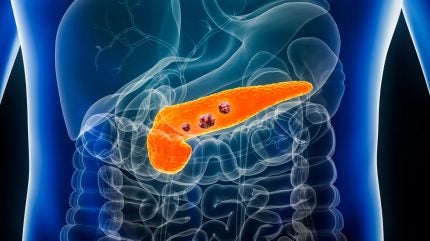预约演示
更新于:2024-12-21
AB-308
更新于:2024-12-21
概要
基本信息
非在研机构- |
最高研发阶段临床1期 |
首次获批日期- |
最高研发阶段(中国)- |
特殊审评- |
登录后查看时间轴
结构/序列
Sequence Code 941102181

Sequence Code 941102232

关联
1
项与 AB-308 相关的临床试验NCT04772989
A Phase 1/1b Study to Evaluate the Safety and Tolerability of AB308 in Combination With AB122 in Participants With Advanced Malignancies
This is a Phase 1/1b, multicenter, open-label, dose-escalation, and dose-expansion study to evaluate the safety, tolerability, pharmacokinetic (PK), pharmacodynamic (PD), and clinical activity of AB308 in combination with zimberelimab (AB122) in participants with advanced malignancies.
开始日期2021-03-19 |
申办/合作机构 |
100 项与 AB-308 相关的临床结果
登录后查看更多信息
100 项与 AB-308 相关的转化医学
登录后查看更多信息
100 项与 AB-308 相关的专利(医药)
登录后查看更多信息
11
项与 AB-308 相关的新闻(医药)2024-07-09
The asset is currently being investigated as a potential treatment for metastatic pancreatic ductal adenocarcinoma. MattL_Images/Shutterstock.
Taiho Pharmaceutical
has exercised an option for an exclusive licence to develop and commercialise
Arcus Biosciences
’ quemliclustat (AB680) in Japan and Asian territories, excluding mainland China.
This is the fourth time Taiho has opted into an Arcus programme under the ongoing collaboration between the two companies which began in 2017.
Taiho will make an option exercise payment.
Additional milestones payments are contingent on meeting clinical, regulatory and commercial goals.
Taiho will also pay royalties on net sales if the product is approved.
See Also:
Hong Kong approves Leqembi for Alzheimer’s treatment
Rgenta Therapeutics’ RGT-61159 gains IND approval to treat cancers
An investigational small molecule CD73 inhibitor, quemliclustat is being investigated as a potential treatment for metastatic pancreatic ductal adenocarcinoma (mPDAC).
Arcus plans to launch the global, registrational Phase III study PRISM-1 in 2024, which will assess quemliclustat plus chemotherapy against chemotherapy alone in previously untreated mPDAC patients.
The decision to progress to Phase III trials stems from promising overall survival results from the Phase Ib ARC-8 study.
With this licensing agreement, Taiho will support the development and potential commercialisation of quemliclustat and will also manage the operational aspects of the PRISM-1 study in Japan.
Taiho has already secured exclusive development and commercialisation rights for four Arcus programmes in Japan and Asian regions excluding mainland China.
These include the CD73 inhibitor programme (quemliclustat), the dual A2a/b adenosine receptor antagonist programme (etrumadenant), the anti-PD-1 programme (zimberelimab), and the anti-TIGIT programme (domvanalimab and AB308).
Gilead Sciences
holds the rights to commercialise quemliclustat in the US and co-promote with Arcus, as well as exclusive rights to develop and commercialise the product outside the US.

引进/卖出上市批准临床3期临床2期临床1期
2024-07-07
TIGIT靶点成药之路仍未看到尽头,与之相比,负面消息倒是时有看到。
7月3日,罗氏旗下公司基因泰克披露,tiragolumab在转移性非鳞状非小细胞肺癌II/III期研究(SKYSCRAPER-06)折戟。由于无法跟对照组拉开疗效差距,该项临床不得不叫停。
罗氏股价消息公布在次日开盘跌出3%,但随后又逐渐收复失地——或许在更长的时间维度,投资者已经被类似的失败脱敏,见怪不怪了。
2009年,TIGIT在Nature Immunology上首次见诸公众;而再往前追溯,可定位于2002年基因泰克科学家在实验室的一次发现。该靶点的热度转向,发生在2020年5月,源自罗氏公布的一则试验结果。正是这次失败的Tiragolumab,在当时联合PD-L1单抗Tecentriq,显示出不俗的初步数据。
各家公司入局,故事却并没有朝着众人预期的方向发展。包括Tiragolumab在内,失败的TIGIT抑制剂项目并不少见。
客观来说,小细胞肺癌本就是“研发黑洞”,TIGIT靶点的前景,主要取决于能否在非小细胞癌领域取得成功。不过,Tiragolumab作为TIGIT药物的先驱,它的失利依然会让市场有所思考。至少,它可能会改变市场对TIGIT未来的理解和预期。
罗氏该如何走出下一步?TIGIT靶点最终能迈向成功吗?
1
罗氏心不死
说到罗氏在TIGIT和非小细胞肺癌上吃的亏,这不是第一次。
罗氏是第一家将TIGIT靶点开发为抗体药物的MNC。临床前数据让该公司为之信心满满,一度连开了13项临床实验,开头两局就剑指最大的癌肿,小细胞肺癌和非小细胞肺癌。
可惜,2022年TIGIT靶点先后遭遇两次打击。
先是2022年3月,罗氏宣布PD-L1+TIGIT+化疗联合治疗小细胞肺癌的III期临床未达到PFS和OS共同主要终点。
紧接着,2022年5月,罗氏再次宣布,PD-L1+TIGIT联合治疗PD-L1高表达非小细胞肺癌的III期临床失败,未能达到PFS主要终点。
领头药企在两项关键临床试验的失败,无疑给TIGIT的未来增添了巨大的不确定性。不过,大部分大药厂依然对其充满期待。即便在两度遭受打击后,罗氏仍然未放弃对TIGIT的押注。
罗氏曾表示,它将继续TIGIT的研究,直到总生存期结果出炉,同时其针对一线食管鳞癌适应症的III期(SKYSCRAPER-08)临床研究将公布中国人群结果。此外,在对2023年的展望中,罗氏也把TIGIT资产列在值得关注的计划内。
时间来到今天,不“死心”的罗氏公布了SKYSCRAPER-06研究数据,该研究随机将患者分为两组,一组接受tiragolumab和Tecentriq治疗,另一组接受默沙东的Keytruda和化疗治疗。参与者患有之前未接受过治疗的局部晚期不可切除或转移性非鳞状非小细胞肺癌。
罗氏发现,在第一次中期分析中,Keytruda的生存数据表现更佳,PFS评估产生的风险比为1.27。同时,风险比高于1,这代表对照组的表现优于研究治疗组,患者使用Keytruda比使用tiragolumab更长寿。罗氏仍旧无法打败“K药”。
2
家家有本难念的经
在TIGIT赛道上负重前行的,不止罗氏自己。
2021年12月底,百济神州将TIGIT抑制剂ociperlimab的海外权益转给诺华,交易金额29亿美元,让TIGIT轰动一时。如今长尾效应仍在持续。
2022年12月19日,吉利德/Arcus发布的TIGIT/PD-L1联合疗法的II期临床(ARC-7)结果。从结果来看,ARC-7数据积极。与PD-1抑制剂zimberelimab作为单一疗法相比,三个治疗组zimberelimab单药、zimberelimab/domvanalimab(TIGIT)双药、zimberelimab/domvanalimab/etrumadenant三药,均达到PFS。
默沙东针对TIGIT单抗的研发同样在继续中。目前默沙东TIGIT单抗+K药+化疗的临床试验已进入临床III期。MCN眼中的TIGIT靶点还能再“抢救”一下。
目前,全球针对TIGIT靶点已研发出多款药物,至少5款进入III期临床,近10款进入2期临床,近20款进入1期临床。在研TIGIT靶向药药物类型多样,涉及单抗、双抗、化药、融合蛋白,其中TIGIT靶向双抗作用靶点多样,涉及PD-1/TIGIT、PD-L1/TIGIT、CD112R/TIGIT、LAG3/TIGIT、TGF-β/TIGIT等。
Tiragolumab、MK-7684A(Pembrolizumab/Vibostolimab)、Ociperlimab、Domvanalimab和Vibostolimab等药物进展较快,目前已进入III期临床。
图丨全球在研TIGIT管线一览,来源:公司官网
据不完全统计,近年来全球药企围绕TIGIT靶向药达成了数项交易。
2018年4月,阿斯利康与Compugen签订独家授权协议。据协议,Compugen将包括COM902在内的TIGIT单抗独家许可给阿斯利康以开发双抗和多抗。
2018年12月,Astellas以4亿美元的价格收购Potenza Therapeutics,获得后者TIGIT、NRP1、GITR三个抗体。
2019年4月,Mereo BioPharma收购Oncomed Phaemaceuticals,获得后者包括TIGIT抗体Etigilimab(现名为MPH-313)在内的4个项目。
2020年5月,吉利德与Arcus Biosciences达成一项为期10年的合作,共同开发和商业化Arcus Biosciences研发管线中的候选药物,其中包括PD-1抑制剂和TIGIT抑制剂。2021年11月,吉利德宣布行使选择权,获得Arcus Biosciences包括TIGIT单抗domvanalimab和AB308在内的多个研发项目。
2021年5月,BMS宣布与Agenus达成一项15.6亿美元的授权协议,获得Agenus专有的双特异性抗体项目AGEN1777的全球独家授权。
2021年6月,GSK与iTeos Therapeutics达成合作,共同开发和商业化EOS-448。
2021年12月,百济神州与诺华达成合作协议,授予诺华在美国、加拿大、欧洲多国及日本开发、生产和商业化TIGIT抗体Ociperlimab的权益。而诺华将支付3亿美元预付款,6亿美元或7亿美元的额外付款,18.95亿美元里程碑,以及20%-25%的销售分成。然而,诺华与百济神州终止了该合作。
相比于交易的火热,TIGIT的对外表现有点“雷声大,雨点小”的意味,留给外界的叹息声似乎更多。
在罗氏失败后,GSK与合作伙伴iTeos重新评估了TIGIT项目,最终还是决定继续TIGIT项目。
BMS在潜在的风险面前,同样选择了撤退。
2023年2月,BMS在公布财报时透露,决定终止TIGIT抑制剂BMS-986207的II期临床试验,该药是与CTLA-4抑制剂Yervoy、PD-1抑制剂Opdivo构成三联疗法的一部分。
BMS首席医学官Samit Hirawat透露,他们在联合用药时观察到了毒性,出于安全考虑,BMS决定终止这项试验。
另一家大药企诺华,虽然没有放弃TIGIT单抗的研发,但其研发TIGIT的进度却放慢了。
关于TIGIT,大家都在谨慎中带着一丝拘谨,但总体来说,“唱衰”的声音更多,罗氏的失败可能仍会接连上演。
识别微信二维码,添加生物制品圈小编,符合条件者即可加入
生物制品微信群!
请注明:姓名+研究方向!
版
权
声
明
本公众号所有转载文章系出于传递更多信息之目的,且明确注明来源和作者,不希望被转载的媒体或个人可与我们联系(cbplib@163.com),我们将立即进行删除处理。所有文章仅代表作者观点,不代表本站立场。
临床3期临床失败临床2期临床结果临床终止
2023-08-07
Arcus Biosciences said the combo treatment “is not expected to demonstrate sufficient clinical benefit."
Arcus Biosciences and Gilead have decided not to advance their A2R inhibitor in prostate cancer after taking a look at some early clinical data.
The two companies are studying the candidate, called etrumadenant, in trials of various cancers in combination with chemo and other drugs. One of these trials, a phase 1b/2 study dubbed ARC-6, had been exploring a combination of etrumadenant plus Arcus’ China-approved lymphoma drug zimberelimab and the chemotherapy docetaxel to treat metastatic castrate-resistant prostate cancer (mCRPC).
Having reviewed radiographic progression-free survival data from the trial, Arcus said the combo treatment “is not expected to demonstrate sufficient clinical benefit in castration-resistant prostate cancer to warrant further investment.”
While the study will be allowed to complete, the companies have decided to deprioritize any further development of etrumadenant in mCRPC, Arcus said in its second-quarter earnings report.
Another phase 1b/2 trial, called ARC-9, that is evaluating a etrumadenant-zimberelimab-chemo combo in mCRC is already fully enrolled and is expected to read out in the first half of 2024, Arcus added.
Prostate cancer was only one arrow in etrumadenant’s quiver. The A2a/A2b adenosine receptor antagonist is also being assessed as part of combination treatments across two lung cancer trials as well as for colorectal cancer.
Etrumadenant appeared to show its worth at the American Society of Clinical Oncology (ASCO) annual meeting in June. It was at that conference that Gilead and Arcus provided an update on a phase 2 trial testing anti-TIGIT monoclonal antibody domvanalimab in combination with zimberelimab that demonstrated a 33% reduction in the risk of lung cancer progression compared to zimberelimab alone. When etrumadenant was added to the mix, the risk reduction fell slightly to 28% compared to zimberelimab alone.
Gilead first partnered with Arcus on etrumadenant in a $725 million deal back in 2021 that also spanned the anti-TIGIT drugs domvanalimab and AB308 as well as the CD73 inhibitor quemliclustat.

临床结果临床2期ASCO会议
100 项与 AB-308 相关的药物交易
登录后查看更多信息
研发状态
10 条进展最快的记录, 后查看更多信息
登录
| 适应症 | 最高研发状态 | 国家/地区 | 公司 | 日期 |
|---|---|---|---|---|
| 晚期癌症 | 临床1期 | 美国 | 2021-03-19 | |
| 晚期癌症 | 临床1期 | 波兰 | 2021-03-19 | |
| 晚期癌症 | 临床1期 | 西班牙 | 2021-03-19 | |
| 晚期恶性实体瘤 | 临床1期 | 美国 | 2021-03-19 | |
| 晚期恶性实体瘤 | 临床1期 | 波兰 | 2021-03-19 | |
| 晚期恶性实体瘤 | 临床1期 | 西班牙 | 2021-03-19 | |
| 弥漫性大B细胞淋巴瘤 | 临床1期 | 美国 | 2021-03-19 | |
| 弥漫性大B细胞淋巴瘤 | 临床1期 | 波兰 | 2021-03-19 | |
| 弥漫性大B细胞淋巴瘤 | 临床1期 | 西班牙 | 2021-03-19 | |
| 食管癌 | 临床1期 | 美国 | 2021-03-19 |
登录后查看更多信息
临床结果
临床结果
适应症
分期
评价
查看全部结果
| 研究 | 分期 | 人群特征 | 评价人数 | 分组 | 结果 | 评价 | 发布日期 |
|---|
No Data | |||||||
登录后查看更多信息
转化医学
使用我们的转化医学数据加速您的研究。
登录
或

药物交易
使用我们的药物交易数据加速您的研究。
登录
或

核心专利
使用我们的核心专利数据促进您的研究。
登录
或

临床分析
紧跟全球注册中心的最新临床试验。
登录
或

批准
利用最新的监管批准信息加速您的研究。
登录
或

特殊审评
只需点击几下即可了解关键药物信息。
登录
或

来和芽仔聊天吧
立即开始免费试用!
智慧芽新药情报库是智慧芽专为生命科学人士构建的基于AI的创新药情报平台,助您全方位提升您的研发与决策效率。
立即开始数据试用!
智慧芽新药库数据也通过智慧芽数据服务平台,以API或者数据包形式对外开放,助您更加充分利用智慧芽新药情报信息。
生物序列数据库
生物药研发创新
免费使用
化学结构数据库
小分子化药研发创新
免费使用

